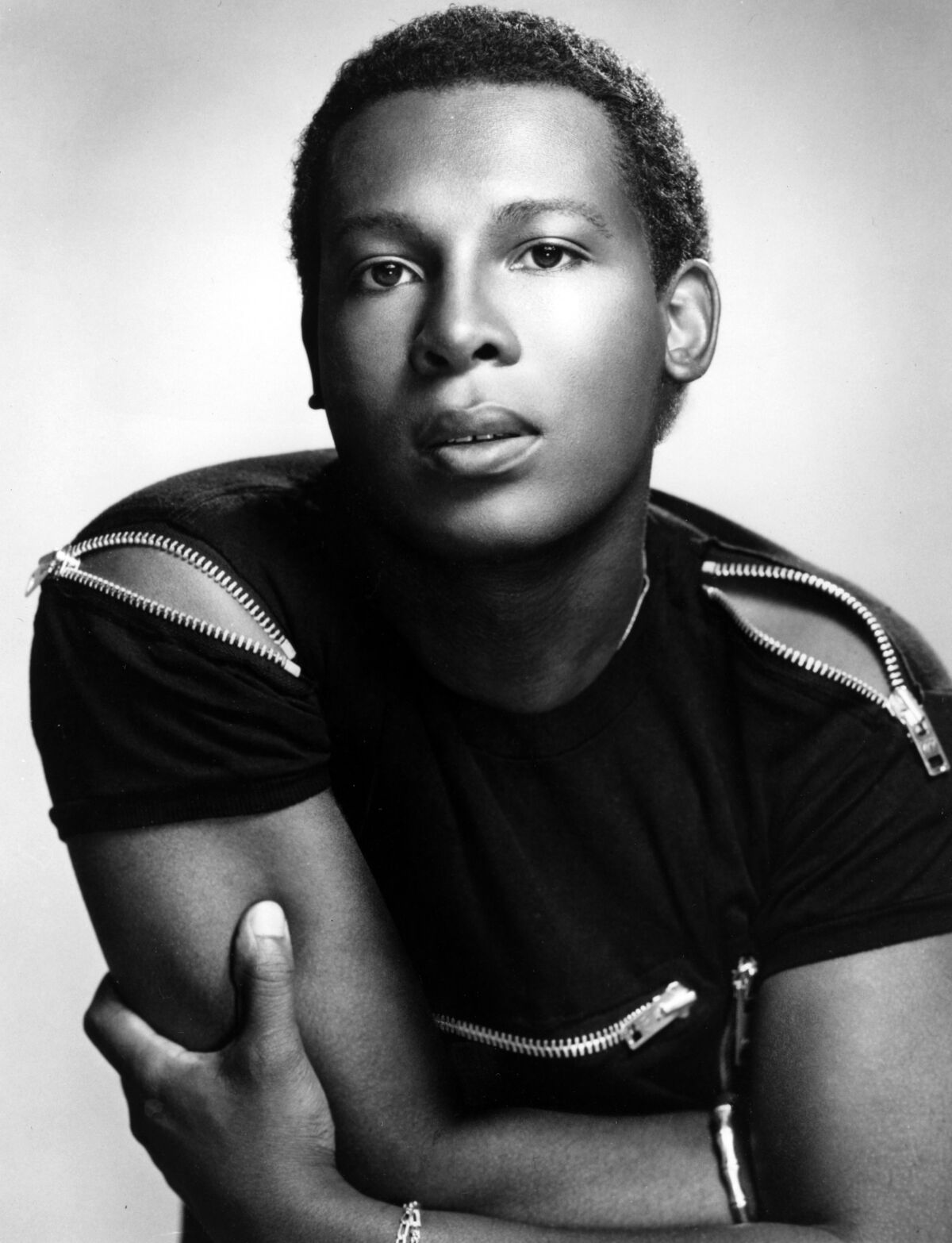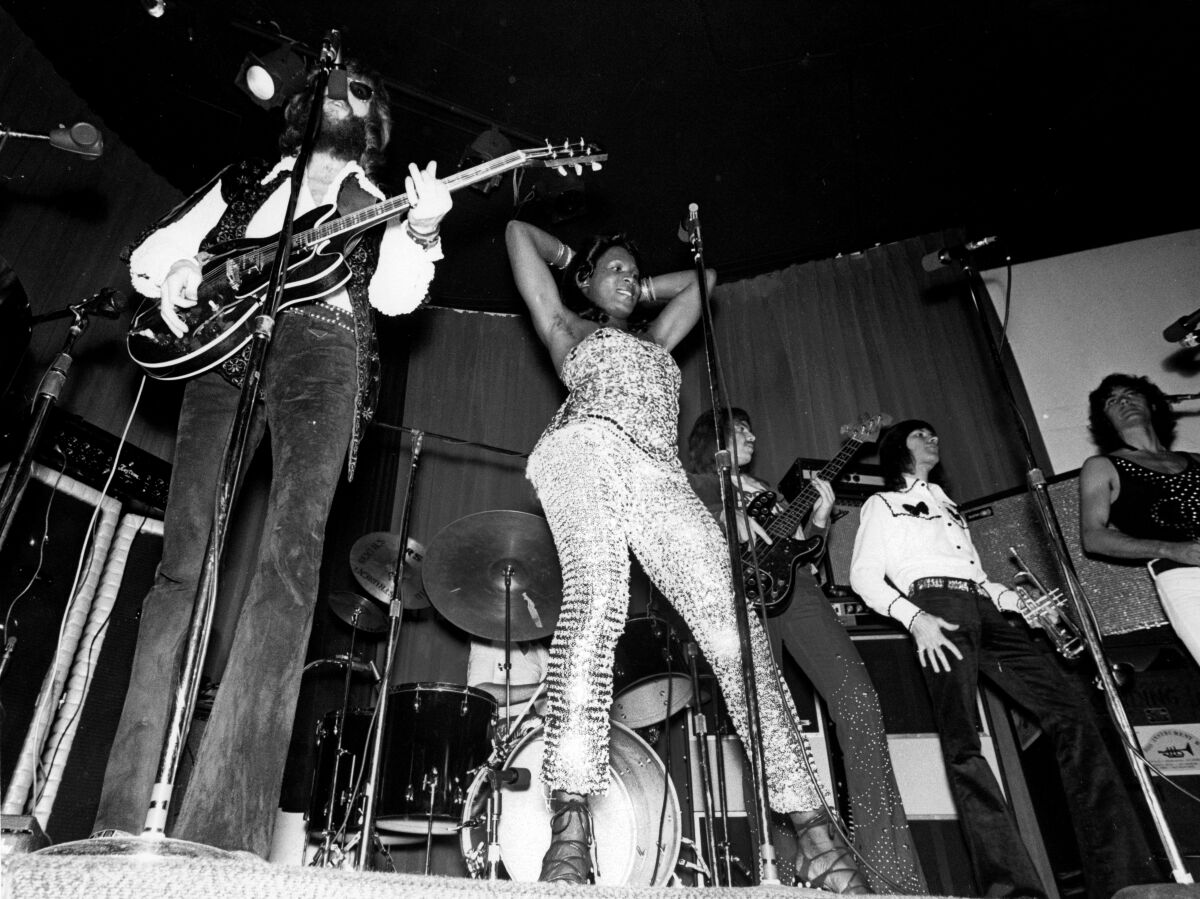One blazing afternoon in the summer of 1973, Rudy Calvo found himself at loose ends. He was heading to the Whisky a Go Go to see a swish band and needed a chic getup to match. So Calvo, a makeup artist from Costa Rica who’d long called L.A. home, went to the West Hollywood flea market. As he sifted through heaps of turquoise jewelry, patchwork fabric piles, and other ephemera filling the parking lot, a tall Black man with a shock of pink hair walked by and caught his gaze.
When Calvo strolled into the Whisky that night, he realized the same pink-tressed man at the flea market was now unleashing a falsetto wail into the microphone, with the pummeling blues-rock of the Hot Band backing him onstage. The vocalist, who went by Sylvester, strutted across the room with dozens of bangles rattling on his arms, and a full face of makeup glistening under the stage lights, while delivering smoldering covers like Billie Holiday’s “God Bless the Child” and Procol Harum’s “A Whiter Shade of Pale.”
While the flamboyant glam magnetism and androgyny of stars including Alice Cooper, Marc Bolan and David Bowie raised eyebrows at the time, Sylvester’s idiosyncratic aesthetic, vocal prowess and intrepid queerness made him a peerless figure. When he wasn’t jamming with the Hot Band, Sylvester suited up in vintage gowns and pearls, a gardenia tucked behind his ear, and sang torch songs from the early 20th century as Ms. Ruby Blue, a persona he’d invented. “I’ve always lived out my fantasies of being whatever I wanted to be — I did all the things that I thought stars do,” Sylvester once said.
“Nobody was that out there, that far out,” Calvo remembers. Yet Sylvester was assured in himself. When Joan Rivers interviewed Sylvester later in his life, she asked him what his family thought about him being a drag queen. Throwing his hands up to the heavens, he retorted: “I’m not a drag queen — I’m Sylvester!”
Sylvester James Jr., who died in 1988, is best known as an architect of disco, with the era-defining singles “You Make Me Feel (Mighty Real),” a ravishing testament to feeling authentic in one’s skin, and the flirtatious abandon of “Do Ya Wanna Funk” that illuminated queer dance clubs from Los Angeles to London. Yet the focus on Sylvester’s glittering disco era success often overshadows the breadth of his artistry. The gospel-tinged avant-garde songs he wrote were as moving as his disco tunes, and he could bust out a baritone as seamlessly as that spine-jolting falsetto. He had a preternatural knack for identifying and collaborating with transcendent singers long before they became household names, including the Pointer Sisters as well as Martha Wash and Izora Rhodes, who’d later release the smash “It’s Raining Men” as the Weather Girls.
“Disco Heat: The Fantasy Years 1977-1981,” a new Sylvester anthology released last week by Real Gone Music, offers a glimpse of his music from the Fantasy Records years, the period when he recorded the disco hits that made him a star. It also includes deeper cuts from that era, like the sublime “I (Who Have Nothing),” along with a range of ballads, poppier numbers, bouncy funk and the reggae-imbued synthesizer-driven gem “I Need Somebody To Love Tonight.”
Released during Pride Month, the anthology arrives at a time when Sylvester’s influence continues to resurface in pop culture, inspiring artists including Lil Nas X, Big Freedia and Mykki Blanco. “One of the reasons that I was interested in this project is because [Sylvester] was such a groundbreaker,” says Gordon Anderson, the co-president of Real Gone Music. “I’m hoping this package does help people rediscover him, because a talent like his should be celebrated.”
Sylvester’s remarkable vision “went way back to his youth in L.A., where he was already walking on the edge,” says Calvo, who later became friends with Sylvester. Letha, Sylvester’s mother, cleaned homes in Baldwin Park and took care of him and his siblings; his father, Sweet, left when he was a baby. As a teenager growing up in the 1950s and early 1960s, Sylvester joined the roving party crew the Disquotays. They donned daring getups and fancied themselves as the Folies Bergère of South Central, as fellow Disquotay Diane Moorehead later described it — an especially radical move at the time, given that authorities enforced “anti-masquerading” laws and, in Los Angeles, Rule No. 9 decreed that impersonating or dressing as the opposite sex was cause for arrest.

Sylvester circa 1975.
(Michael Ochs Archives / Getty Images)
As the Disquotays’ resident hairdresser, Sylvester, known as Dooni in those days, ensured that everyone’s wigs were flouncy and fabulous before they went out on the town to clubs and house parties. That even included celebrity soirees, albeit without their knowledge: A friend of the Disquotays used to housesit for Etta James and they threw ragers at her home when the singer went out of town.
Even within a group that pushed boundaries to the edges, Sylvester was the boldest of them all. His wildly inventive outfits drew both admiration and puzzlement. For the 1966 Watts Summer Festival, Sylvester stapled together a trove of aluminum pie tins to fashion dresses for himself and Tiki, another Disquotay. In his biography “The Fabulous Sylvester,” sociologist Joshua Gamson describes how “when they walked through the festival people were drawn, confused and squinting in the sun, to the blinding silver light that turned out to be Tiki and Dooni.” These theatrical entrances later became central to his live shows: Sylvester would have the band play tantalizing instrumentals from his most beloved songs for long stretches, and only graced the stage when audiences couldn’t contain themselves anymore.

Sylvester performs with his band at the Whisky a Go Go in 1972 in Los Angeles.
(Michael Ochs Archives / Getty Images)
Sylvester also attended all-day worship services at the Pentecostal Palm Lane Church of God in Christ, in South Los Angeles, with his family when he was growing up. By age 3 he was noodling on piano keys and singing at services, with churchgoers sometimes hoisting him on a milk crate so the congregation could see him belting Aretha Franklin songs. The church later shunned Sylvester, though, when it became clear that he was gay.
Finding Los Angeles too closed-minded for his ambitions, Sylvester made his way toward San Francisco’s freewheeling queer scene in 1970, where he lived in a dilapidated Victorian house and performed around town with the Cockettes, a rowdy, flamboyant variety show that counted a young John Waters as an admirer. Sylvester turned heads within this provocateur troupe, too: While the Cockettes didn’t rehearse much and seemed (gleefully) unprepared onstage, his polished performances — and that falsetto — drew crowds.
Sylvester eventually caught the attention of Berkeley-based Fantasy Records, of Creedence Clearwater Revival fame. Run by Harvey Fuqua, a Motown alum turned record producer, and producer Nancy Pitts, the label signed him after his performance at a small San Francisco club. In 1978, a year after he’d initially recorded his modestly successful cover of Ashford and Simpson’s “Over and Over,” Sylvester started to come around to disco — a buzzy genre he was initially skeptical of. One day in the studio he started riffing with his band, urging them to try playing a disco beat as he made up the lyrics on the fly; it became “Mighty Real.” Later, Fuqua would say “there’s only two people in this business that I’ve worked with who have really, really got it: Marvin Gaye and Sylvester.”
The strength of “Mighty Real” made Sylvester famous; the song shot to No. 1 on the Billboard Dance chart, he was now opening for Chaka Khan and the Commodores, and he nabbed a role as a drag queen impersonating Diana Ross in 1979’s “The Rose,” starring Bette Midler. That same year he became the first openly gay star to perform at San Francisco’s War Memorial Opera House, where he received the key to the city from the administration of then-mayor Dianne Feinstein.
But his relationship with Fantasy unraveled a few years later. The label didn’t want Sylvester’s gender-bending image to be front and center, so they asked him to dial it back. And disputes over royalties led Sylvester to officially part ways with Fantasy in the early 1980s. “I don’t know that Fantasy knew quite what to do with him,” Anderson says. “Fantasy … had Creedence. I’m not sure how adept they were at promoting him.”
Anderson remembers reading about Sylvester’s genderbending strides in “The Rolling Stone Record Guide” in the 1980s. The stories stuck with him. Decades later, while doing business with Concord Music, he realized that Sylvester’s music from that era had never been fully anthologized. The process took years, in part because many songs were only available as 12” mixes — or what was played in ‘70s-era clubs. Meaning original album masters and unique mixes alike had to be hunted down from a massive vault.
Even with the delay, the “Disco Heat” release couldn’t be more urgent. “The relevance of this project has increased exponentially because of the right-wing furor over trans people [and drag].…” Anderson says. “He was just so out. He was just unapologetically who he was, which must have taken an enormous amount of courage.”
That’s especially true of his activism as well. When the AIDS crisis hit, particularly in Sylvester’s own adopted hometown of San Francisco, he became hell-bent on advocating for AIDS-relief organizations, and spoke to media outlets frankly about the pandemic decimating his community. In an interview with The Times in 1988, Sylvester said that “it bothers me that AIDS is still thought of as a gay, white male disease,” pointing out that more than 25% of people affected with AIDS at the time in the U.S. were Black. “The Black community is at the bottom of the line when it comes to getting information, even when we’ve been so hard hit by this disease. I’d like to think that by going public myself with this, I can give other people courage to face it.”
When he died later in 1988 from AIDS complications, a year after his partner Rick Cranmer passed away, Sylvester left his future music royalties to two charities for AIDS patients. To this day, they continue to help fund these programs.
Sylvester’s star continues to shine. A few years ago, two “RuPaul’s Drag Race” contenders battled it out with a sudden-death lip-sync to “Mighty Real” — which introduced Sylvester to an emerging generation of genderbending artists and music fans. In 2022, he was the subject of a deep-dive podcast, Spotify’s “Sound Barrier,” hosted by Jason King, the incoming dean of USC’s Thornton School of Music. A recent show at L.A.’s Honor Fraser Gallery that probed tech, drag and queer avatars drew its title from “Mighty Real.” And New York’s Lincoln Center presented a Sylvester concert tribute on Thursday. But these celebrations are also bittersweet. They underscore the fact that this singular artist’s life was cut short in a world that didn’t fully embrace him or the tremendous scope of his talents.
“He definitely had to push the envelope for a long time,” Calvo says. “And I think he just wanted to get to that point where he could be Sylvester.”
For all the latest Entertainment News Click Here
For the latest news and updates, follow us on Google News.
